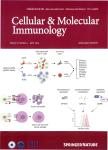Cancer-associated fibroblasts express CD1d and activate invariant natural killer T cells under cellular stress
作者机构:Department of MicrobiologyTumor and Cell BiologyKarolinska InstitutetStockholmSweden Division of Translational Cancer ResearchDepartment of Laboratory MedicineLund University Cancer CentreLund UniversityLundSweden
出 版 物:《Cellular & Molecular Immunology》 (中国免疫学杂志(英文版))
年 卷 期:2024年第21卷第1期
页 面:91-94页
核心收录:
学科分类:1001[医学-基础医学(可授医学、理学学位)] 100102[医学-免疫学] 10[医学]
基 金:supported by the Swedish Research council and the Swedish cancer foundation
摘 要:Invariant natural killer T(iNKT)cells are part of the family of unconventional T cells,and they recognize glycolipid antigens presented on the MHC class I like molecule CD1^([1]).In humans there are five CD1 molecules named CD1a to CD1e,whereas mice use only CD1d for lipid ***,iNKT cells can elicit both cytotoxicity similarly to conventional CD8 T cells and secrete cytokines that influence the adaptive immune response including providing direct T cell help to B cells^([2]).In the context of tumors,they can use both release of granzyme B and use Fas-mediated mechanisms for killing of tumor *** iNKT cells use a restricted TCR repertoire and CD1 molecules are non-heterogenous the risk of graft vs host disease is limited and thus these T cells have been an attractive option for off the shelf immunotherapy to treat cancer^([3]).



